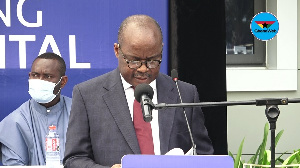 Dr. Ernest Addison is the Governor of the Bank of Ghana
Dr. Ernest Addison is the Governor of the Bank of Ghana
The Supreme Court has dismissed a case filed by the Association of Finance House challenging the Bank of Ghana for issuing corporate governance directives for financial institutions, ruling that the regulator’s action was lawful.
The Association of Finance House, in November 2020, brought an action in the Supreme Court of Ghana challenging the Bank of Ghana’s authority to issue the directive – arguing that it ought to have been issued by Parliament as a Legislative Instrument in accordance with Article 11(7) of the 1992 Constitution of the Republic of Ghana.
However, on July 28 2021, the Supreme Court, in a unanimous decision, dismissed the action brought by the Association of Finance Houses and held that the corporate governance directive was lawfully issued by the Bank of Ghana.
The court ruled that the Central Bank’s independence is guaranteed under the 1992 Constitution, hence making it subject to parliamentary scrutiny and oversight would be upsetting the necessary independence of the Bank.
It further held that requirements and directives issued by the Bank of Ghana are administrative actions that the Bank is empowered to craft and issue; hence any contrary view would subject the administratively regulatory functions of the Bank to Parliament and cause a fossilised approach to what may only require an administrative and regulatory mechanism to correct issues within the financial sector.
Again, the Supreme Court added that the Constitution did not intend the central Bank’s internal workings and regulatory responsibilities to be under the constant supervision of Parliament, as this would introduce the danger of slowing and grinding the work done by the Bank to a gradual halt.
The court again said subjecting the Bank of Ghana to undue parliamentary oversight will upset the necessary independence of the Bank and undermine the system of separation of powers and regulatory functions of the Bank of Ghana, as enshrined in the Constitution.
…Court of Appeal rules Nii Amanor Dodoo can act as Receiver, for now,
The Court of Appeal, on July 25, 2021, stayed the execution of the ruling by the High Court in the case of uniBank v Dr. Duffour and nine others – essentially meaning the Receiver, Nii Amanor Dodoo, can continue to act as such.
In the High Court ruling dated June 24 2021, it was held that the appointment of Nii Amanor Dodoo as Receiver of uniBank Ghana Limited was void and of no effect.
In the civil case to recover over GH¢5.7billion from Dr Kwabena Duffour and the other defendants, the High Court granted an application by Dr Kwabena Duffour and the other defendants and struck out uniBank’s case against them, based on the argument that Nii Amanor Dodoo should not have accepted Bank of Ghana’s appointment as Receiver of uniBank on the basis that two years had not passed since he worked on the team of the Official Administrator of the Bank.
UniBank, acting through the Receiver as its legal representative, appealed against the decision on June 28, 2021, and filed an application for Stay of Execution – arguing that the High Court’s ruling was likely to be reversed on appeal, and a successful appeal would be rendered useless if (while the appeal was pending) Dr Duffour, the other defendants and anybody else relied on the now-suspended ruling to the detriment of uniBank.
In a unanimous judgment read by Justice Mrs Margaret Welbourne, a Justice of the Appeal Court, the Court of Appeal held that the grounds of appeal contained “arguable points of law”. The Court of Appeal also ruled that uniBank, acting through the Receiver as its legal representative, had demonstrated that there were “exceptional circumstances” supporting the suspension of the High Court’s ruling, including the impact the ruling could have on the entire financial sector.
The import of this decision by the second-highest court in Ghana is that Nii Amanor Dodoo can continue to act as Receiver of uniBank, while the appeal progresses.